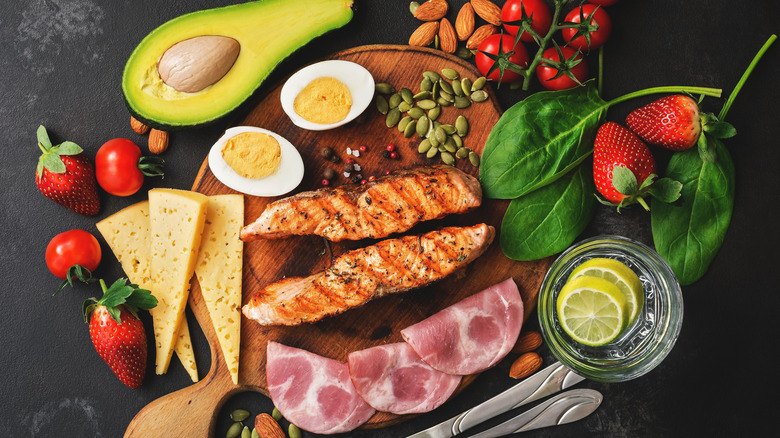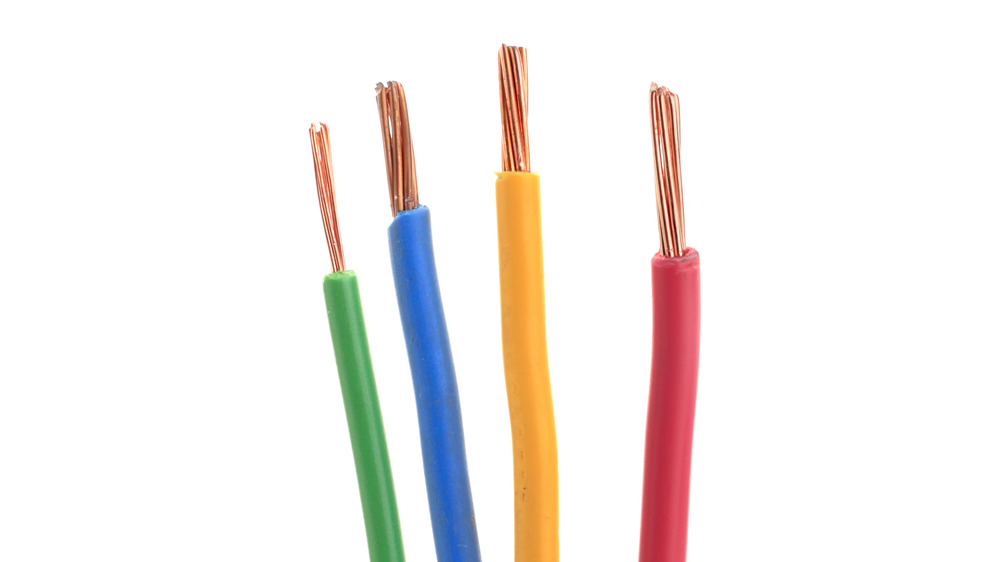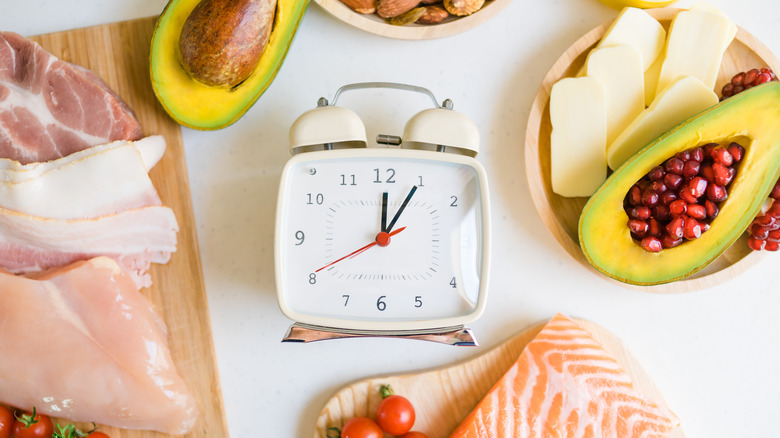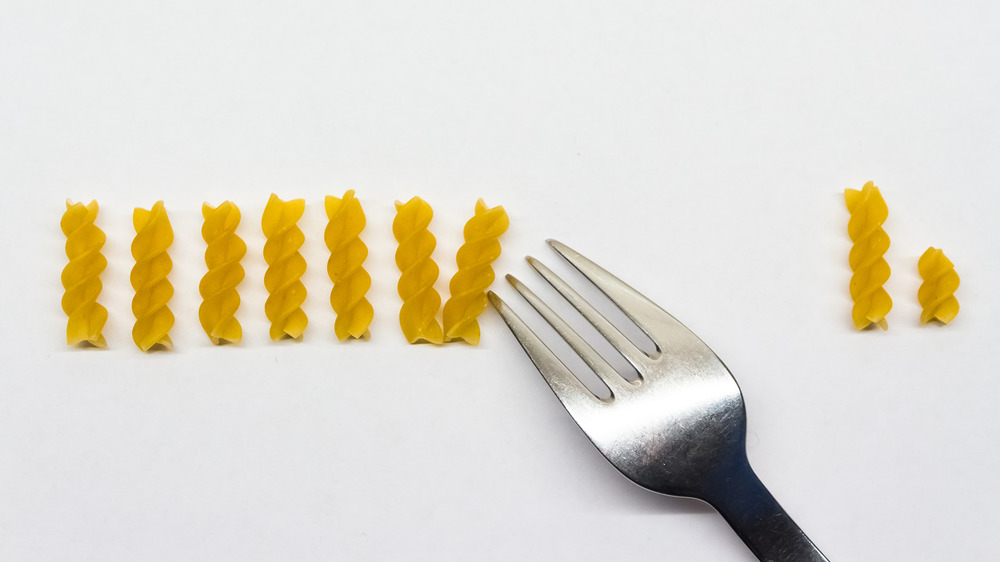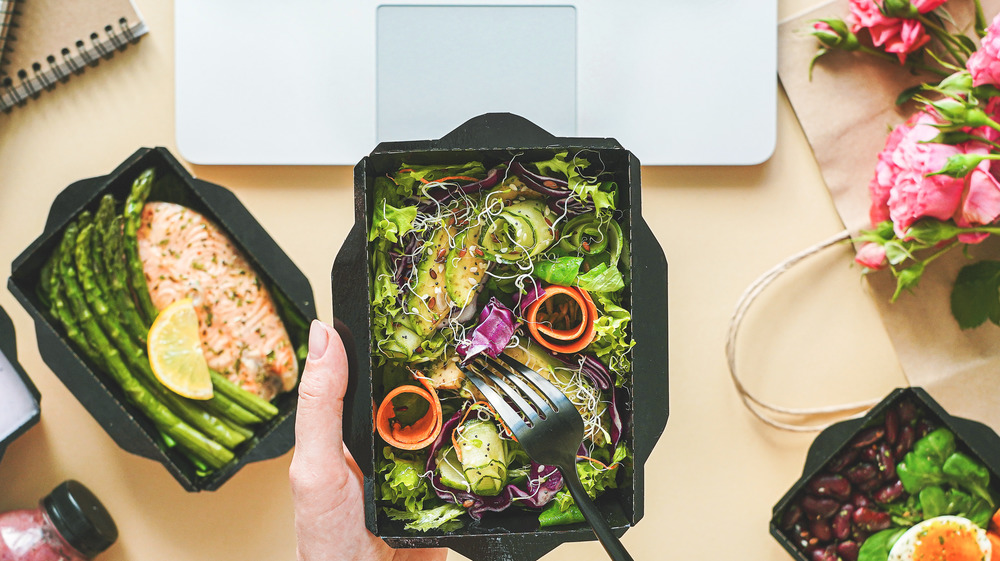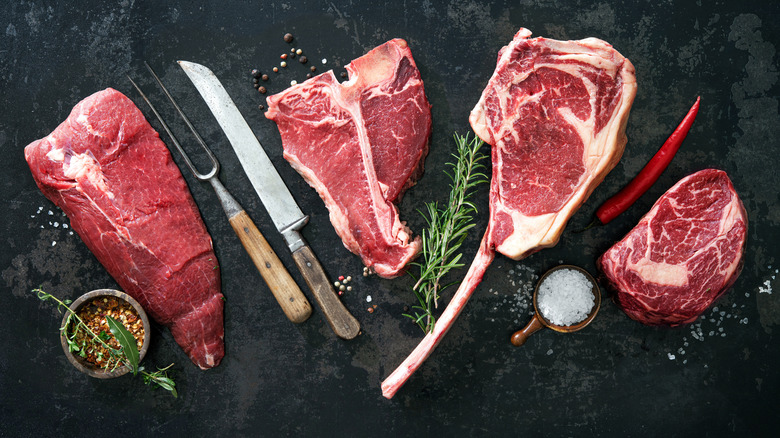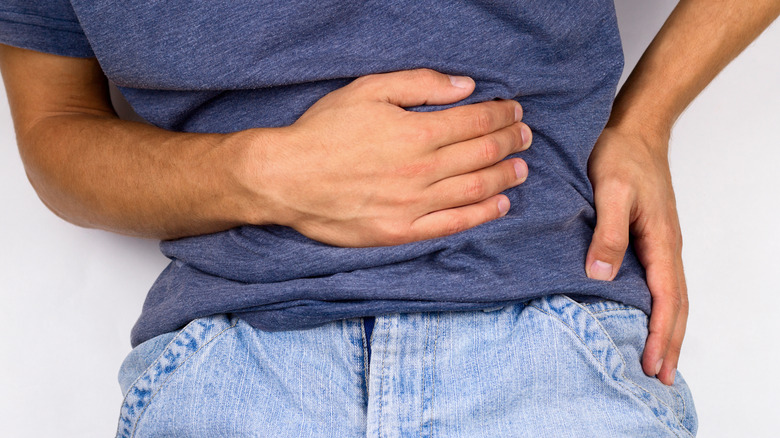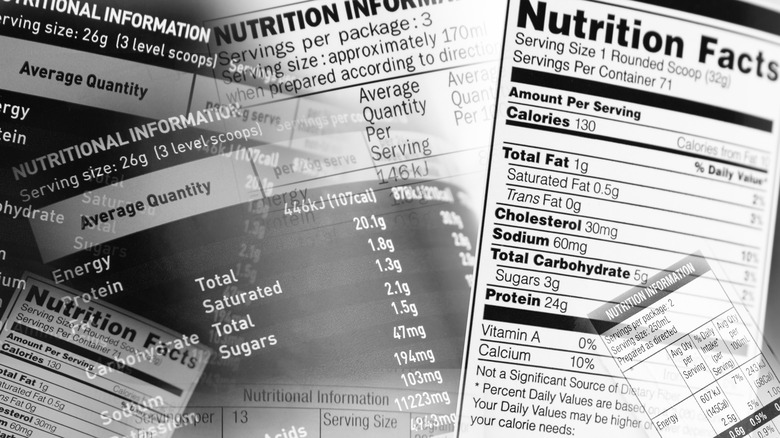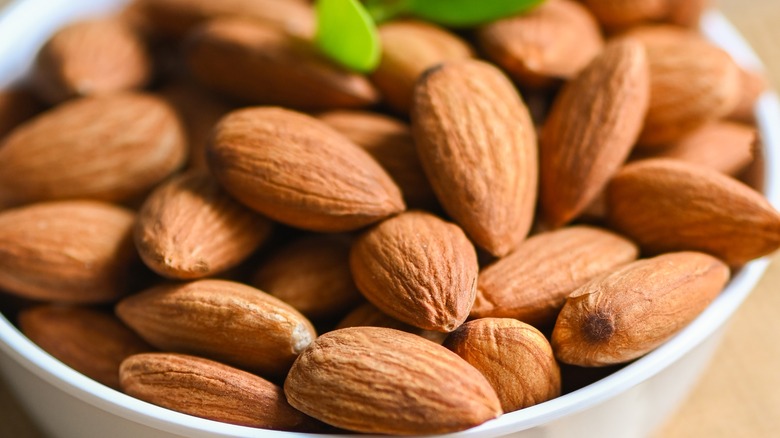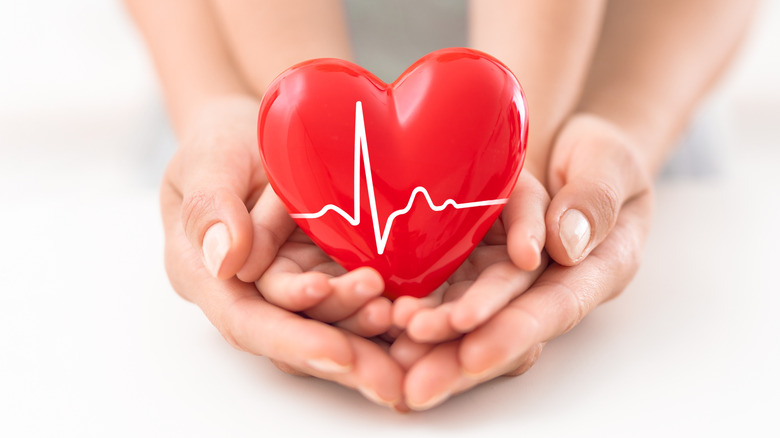The Truth About The Atkins Diet
There are countless diets out there, but the Atkins diet is arguably one of the most famous. It's been around since 1972 and consistently appears on the U.S. News and World Report's annual diet rankings.
As you likely know, Atkins is a low-carb diet that emphasizes foods high in protein and fat. While it's popular and long-standing, many experts don't recommend it. In fact, the most recent U.S. News diet rankings rated Atkins as number 33 out of 39 diets — not a great result. Many of the diets ranked below Atkins are based on similar low-carb principles, like the keto diet and the Dukan diet.
Despite its poor reviews from health experts, people continue to be curious about the Atkins diet. Maybe you heard about it from a friend, read about it in a magazine, or saw a Robe Lowe Atkins commercial on TV. No matter your reasons for wondering about the Atkins diet and whether or not you should give it a try, it's important to get your facts straight, first. Here's what the Atkins diet is and what experts and the evidence have to say.
Atkins has been around since 1972, long before low-carb was trendy
While the Atkins diet rose to popularity in the 1990s, it's actually been around far longer. The Atkins Diet was created in the 1970s by Robert Atkins, a cardiologist. Atkins wrote his first book, "Dr. Atkins Diet Revolution," in 1972.
As the book explains, "Dr. Atkins personally discovered the incredible effects of a high-protein/low-carbohydrate diet and ... revolutionize[d] his thinking on nutrition and health." The summary also claims that the book reveals the "alarming truth about carbohydrates" and how they're allegedly responsible for "some of our most deadly modern diseases." And, Atkins claims in the book that his diet will help you "never feel hungry again."
Essentially, the book is the first draft of the Atkins diet, which has been modified slightly over the years. The biggest change is that the modern version of Atkins recommends eating lots of low-carb vegetables, whereas the original Atkins diet recommended limiting even these. Newer books on Atkins also include more evidence about how the Atkins diet has actually worked for people.
Atkins is a low-carb diet with four phases
The Atkins diet consists of four phases. First, you cut carbohydrates from your diet almost entirely. Then, you slowly increase the number of carbs you eat.
In phase one of Atkins, you're allowed just 20 grams a day of "net carbs" (the grams of total carbohydrates in a food minus the grams of fiber). Between twelve and fifteen of these grams must come from high fiber "foundation vegetables," including greens and cherry tomatoes. You also eat foods that are high in protein and fat and have zero carbs, like meat, fish, eggs, and oils. This phase lasts until you're within fifteen pounds of your goal weight (via Today).
In phase two, you slowly start increasing your carbohydrate intake by adding certain fruits, nuts, seeds, cottage cheese, and yogurt. When you're within ten pounds of your goal weight, you transition to phase three. Here, you increase carbs slowly, often to about 80 or 100 grams per day, and continue to do so until you reach your goal weight and are able to stay there. In phase four, the goal is to maintain your weight by eating a relatively low-carb but sustainable diet.
On Atkins, you eat primarily meat, fish, dairy, non-starchy vegetables, nuts, seeds, and healthy fats
The Atkins diet is a low-carb diet, which means that it emphasizes foods that are high in protein and fat. In phase one of the diet, you eat meat, fish, seafood, eggs, low-carb veggies (particularly green vegetables), some full-fat dairy products (like butter, cream, and cheese), and healthy oils (via Healthline).
Once phase one is over — when you're within fifteen pounds of your goal weight — you slowly start introducing foods that are a bit higher in carbs. First, you can add previously restricted dairy products (like low-fat yogurt and milk), nuts and seeds (which are high in fat but contain small amounts of carbs), and fruits that are relatively low in carbs, such as berries (via Healthline). Eventually, you add back small portions of starchy vegetables (potatoes and winter squash), beans, legumes, and higher-carb fruits like bananas, apples, and grapes. You'll add back certain other carb-containing foods later on, although it's recommended that you limit these and count the total amount of carbohydrates you eat daily.
The Atkins diet advises against eating grains and sugary foods throughout all phases
In the early phases of the Atkins diet, carb-containing foods like fruits, starchy vegetables, beans, and legumes are off-limits (via Healthline). And, although you're able to eat these carb-containing foods in later phases of the diet, it's still recommended that you limit them. In fact, you'll need to count carbs to make sure you don't go over your daily allotment. The number of carbs you're allowed to eat in later phases of Atkins depends on your goals.
There are certain foods that Atkins advises you to cut out indefinitely. You're meant to avoid sugar and sugary foods (like soda, juice, cake, candy, and cookies) throughout all phases, because they're high in carbs (via Healthline). You're also meant to strictly limit (or avoid) whole grains long-term. For many people, this can be challenging. The Dietary Guidelines for Americans recommend eating between six and eleven servings of grains per day, with at least half of those coming from whole grains, as whole grain consumption has been associated with better health outcomes. On Atkins, you'll miss out on this benefit.
You don't have to count calories on Atkins, but you do have to count carbs
Atkins advocates praise the fact that the diet doesn't require calorie counting. Fair enough, since counting calories every day gets old pretty quick. But what they might not tell you is that Atkins does require some counting — on the diet, you need to count every gram of carbohydrate that you eat.
While on Atkins, you'll need to read nutrition facts labels (and look up nutrition information for foods like fresh produce and meat that don't come with labels) in order to figure out how many net carbs are in all of your meals and snacks. You do this by subtracting the grams of fiber in a food from the total number of carbs in a food (via Mayo Clinic). For example, a cup of asparagus has 5.2 grams of carbs and 2.8 grams of fiber, so it has 2.4 grams of net carbs.
As you can imagine, counting net carbs can get tedious if you're doing it for everything you put in your mouth. If you can't imagine doing this for months or years on end, Atkins may not be for you.
The theory behind Atkins is that without carbs for fuel, your body uses stored fat instead
To understand the reasoning behind Atkins and other low-carb diets, you first need to understand a little bit about how your body gets energy from food (via StatPearls). Our bodies' preferred source of energy is glucose, the building blocks of carbs. Every time we eat carbs, we break them down to glucose. We use that glucose for immediate energy, and then our pancreas releases the hormone insulin, which tells our body to store the rest of the glucose for later. Insulin also prevents our bodies from breaking down stored fat for energy.
In theory, low-carb diets work by forcing our bodies to rely on stored fat for energy instead of glucose. If you're not eating carbs, your body's store of glucose will eventually dwindle. Plus, you won't be releasing much of the hormone insulin into your bloodstream, since there's no need for it when blood glucose levels are so low. All of this means that your body is able to use stored fat for energy.
Like other low-carb diets, Atkins will likely lead to quick weight loss in the first several months
In your first few months on the Atkins diet, you may lose significant amounts of weight. This isn't because your body is burning stored fat for fuel (although that may account for some weight loss). Instead, much of that is water weight. Carbohydrates, broken down into glucose, hold onto water in our bodies (via StatPearls). When we deplete our reserves of stored glucose, we retain less water, and thus our weight goes down. It's so important to keep in mind that losing water weight doesn't have health benefits for most healthy people and that the weight will come back as soon as you start eating significant amounts of carbs again.
In a 2018 review of weight loss studies published in Healthcare (Basel), the authors explained that low-carb diets like Atkins are consistently found to create quick, short-term weight loss in the first weeks or months. However, they are not significantly more effective for weight loss over the course of a year, and most studies don't follow participants for long enough to tell if any kind of diet works for weight loss long term.
After several months on Atkins, weight loss will likely stall or reverse
Although the Atkins diet will likely lead to short-term weight loss in the first weeks or months, you won't sustain that rate of weight loss for longer than that. In fact, you probably won't even be able to maintain the weight that you lost.
In a 2020 review of popular diets published in The BMJ, the authors looked at data from 141 previously conducted clinical trials assessing the effectiveness of various diet approaches. They found that while all diets produced weight loss after six months (with the low-carb diets having a slight advantage here), none of the diets produced significant amounts of weight loss or health benefits after one year.
In other words, participants in these clinical trials, no matter what type of diet they were on, lost weight within the first six months. But, practically none of them were able to keep this weight off at the one-year mark, whether they were on a low-carb, low-fat, or moderate macronutrient reduced-calorie diet. That doesn't just mean you should be wary of Atkins and low-carb diets. It means that you should be wary of all diets.
Eating too much fatty meat on Atkins might raise your risk of heart disease
First, it's important to note here that it is possible to follow the Atkins diet without eating tons of fatty meat. Although you'll be eating primarily fat and protein, you could do so by eating lean cuts of poultry and pork, fish, eggs, and oils rich in unsaturated fats like avocado, olive, and walnut oil.
But, avoiding excess amounts of saturated fat on the Atkins diet does seem unlikely. You'll likely eat steak, bacon, skin-on chicken, butter, and cheese fairly regularly. Unfortunately, these cuts are high in saturated fat, which the Dietary Guidelines for Americans recommends limiting to less than ten percent of your total daily calories. Why? Because excess saturated fat consumption can raise your LDL (bad) cholesterol levels, increasing your risk of heart disease (via American Heart Association).
If you do try the Atkins diet, try not to rely too much on meat and dairy products that are high in saturated fat. And, be sure to eat as many high-fiber veggies as possible, as fiber helps combat high levels of LDL cholesterol and can improve heart health (via American Heart Association).
You may not get adequate fiber in the first phases of Atkins, which can lead to constipation
As we've mentioned, experts recommend getting plenty of fiber each day — from fruits, vegetables, beans, legumes, whole grains, and other plant-based foods — in order to combat high cholesterol and promote heart health (via American Heart Association).
Fiber has more immediate benefits, as well. If you're eating mostly high-protein and high-fat foods on the Atkins diet, you likely aren't getting adequate fiber. The Dietary Guidelines for Americans recommend about 25 grams per day for women and 38 grams per day for men. Because fiber helps bind your stool and adds bulk to it, it helps promote regular bowel movements. In other words, fiber keeps you pooping regularly and prevents acute or chronic constipation (via Mayo Clinic).
If you're in the early phases of the Atkins diet and can't eat many carb-containing foods, make sure you're eating plenty of high-fiber vegetables! If you find yourself feeling constipated or bloated, it's a good idea to go over your daily carb "allowance" in order to get more fiber.
There are three variations of the Atkins diet
Not everyone who goes on the Atkins diet will need to drop their carbohydrate intake to just 20 grams per day. According to VeryWellFit, there are three different Atkins plans to choose from.
Atkins 20, the "classic" Atkins plan, requires eating 20 grams of net carbs or fewer in the first phase and is supposedly meant for people who want to lose over 40 pounds. Atkins 40 is a (slightly) more "relaxed" version of the diet, and people on the plan start by eating 40 grams of net carbs per day from fruits, veggies, nuts, legumes, and whole grains. Then, you increase your carbs by about 10 grams at a time, to find your carb "sweet spot." Supposedly, this diet is meant for people with less than 40 pounds to lose.
Atkins 100 is the most flexible plan, and Atkins recommends it for people hoping to "maintain their current weight." On the plan, you eat 100 grams of net carbs each day. (Which, it's important to note, is less than half the amount of carbs recommended for most people by the Dietary Guidelines for Americans).
The Atkins diet strays significantly from the Dietary Guidelines
The Atkins diet guidelines stray significantly from the Dietary Guidelines for Americans. Although the DGAs allow for a wide range of macronutrients, they recommend that most people get 45 to 65 percent of their calories from carbs, 10 to 35 percent of the calories from protein, and 20 to 35 percent of their calories from fat.
For someone eating 2000 calories per day, this comes out to between 225 and 325 grams of carbohydrates every day — at least eleven times more than the 20 grams per day recommended in phase one of the Atkins diet.
Because Atkins restricts carbs, it means that more of your calories come from protein and fat. As a result, you likely get far more than the recommended percentage of your calories from protein and fat. While this isn't necessarily harmful to everyone, it's so important to make sure that you don't rely too heavily on saturated fat (which is plentiful in fatty meat and dairy) for your daily calories. The DGAs recommend keeping saturated fat to less than ten percent of your daily intake.
Popularity of low-carb diets have made almonds more popular than ever—and the most popular nut on the market
When consumers turn away from high-carbohydrate snacks, such as they're inclined to do as part of the Atkin's diet, there's one go-to option that many of them are turning to: almonds. Low in carbohydrates but full of protein and heart-healthy fats, almonds have quickly become the most popular nut on the market, according to Delish. Specifically, between 2005 and 2014, almond consumption has gone up by 220%, making it even more popular than peanuts.
The Washington Post reported this in 2014, attributing the increased consumption of almonds to changing understanding of healthy nutrition. Because almonds are high in fat, they were often regarded in the past as unhealthy. Now, more people understand that fat — particularly unsaturated fat, such as the kind found in almonds — is part of a balanced diet. And because almonds are full of protein, they are a good plant-based option for vegetarians and vegans, an eating style that has also increased in popularity. In short, low-carb dieters are going nuts for nuts — and almonds are the most popular out of all of them.
There's mixed evidence on what Atkins will do to your cholesterol
When low-carb diets first became popular, experts were concerned that getting so many of your calories from fat, including saturated fat, would raise your LDL (bad) cholesterol to dangerously high levels, increasing heart disease risk. In the research, the effect of low-carb diets on cholesterol levels is actually pretty mixed. According to VeryWellFit, the evidence shows that your blood levels of HDL (good) and LDL cholesterol aren't actually great indicators of whether or not you'll develop heart disease in the future. Half the people with heart disease actually have "normal" levels of LDL cholesterol.
It's also important to note that low-carb diets aren't shown to have a significant effect on your cholesterol levels in the long-term. According to VeryWellFit, low-carb diets don't significantly increase or reduce cholesterol levels, based on the current research.
Still, there's so much we still don't know about the relationship between low-carb, high-fat diets and cholesterol and heart disease. It's best to keep the amount of saturated fat in your diet to a minimum in order to minimize your risk of heart disease in the future.
Studies show Atkins could help people control epileptic seizures (on a diet that's much less restrictive than keto)
Maybe you've heard that a ketogenic diet (commonly referred to as "keto") was originally prescribed as a way of controlling epileptic seizures, as Johns Hopkins Medicine explains. The big problem? A ketogenic diet is incredibly difficult to maintain in the long term, because it requires such a stringent restriction of carbohydrates in order to maintain the presence of ketones (compounds that the body generates when it is deriving energy from fat).
But what research has shown is that a person doesn't have to limit their carbohydrate intake as much as they do on keto in order to protect against epileptic seizures. Instead, a modified Atkins diet is low enough in carbohydrates while still being realistically sustainable for most people to follow.
Per the Epilepsy Foundation, this modified Atkins diet is lower in carbohydrates than even a traditional Atkins diet, but protein intake is not restricted and fat intake is not closely monitored. These aspects mean that a person following a modified Atkins diet can likely still find options at a restaurant or a friend's house on occasions when they aren't eating meals at home. If you're following this diet and go two years without a seizure, it's possible you may be able to stop the diet and return to your normal way of eating.
It's unclear how Atkins might affect your long-term health
When it comes to long-term health and longevity, there's not really a consensus on whether Atkins is helpful, harmful, or neutral. According to WebMD, it's unclear how the increased amount of animal fat and protein associated with Atkins will affect long-term health.
There's also the fact that eating a low-carb diet is hard to sustain. Carbs are everywhere in our modern diets — which isn't necessarily a bad thing — so it's hard to avoid them. A 2020 review of the evidence published in the International Journal of Environmental Research and Public Health looked at existing evidence on low-carb diets as they relate to type 2 diabetes. The authors concluded that, among other issues, participants across existing studies have a hard time sustaining low-carb diets for long periods of time. Plus, most studies only last for between six months and two years, so the fact that participants drop out at relatively high rates even in that time period isn't encouraging.
If you're looking to improve your health, Atkin probably isn't the way. Research is mixed on how it affects health, and it's hard to strictly limit carbs forever.

